|
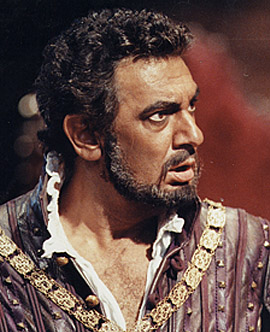 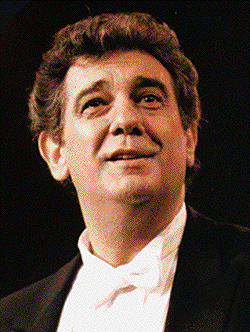
Born January 21, 1941 in Madrid into a busy musical environment that has determined what he is, what he does, and how
he does it. His parents, Plcido Domingo and Pepita Embil, acclaimed zarzuela singers in Spain, started their own
company in Latin America when he was small. From 1949 onwards Plcido and his younger sister Mari Pepa
grew up in Mexico City, where he attended the National Conservatory for an all-round musical education
which included piano, conducting, composition and vocal interpretation. Surprisingly, singing lessons as
such were not on his curriculum.
Placido started off as a classic case of learning by doing, singing small roles in Mexico. Yet his inherent
musicality and intelligence and the astonishing beauty of his virile timbre coupled with a passionate belief in the
importance of text and underlying orchestral fabric, the amazing scope of his repertoire and an incredible amount of
sheer hard work have ensured his place among the mere handful of tenors who wrote operatic history in the 20th century.
And he continues to write history into the 21st century.
Married on August 1, 1962 to Marta Ornelas, Domingo has three sons, Jos (from a previous marriage), Plcido Jr. and
Alvaro. Marta Domingo gave up her own flourishing stage career as a soprano in the mid-1960s in order to devote herself
to the family.
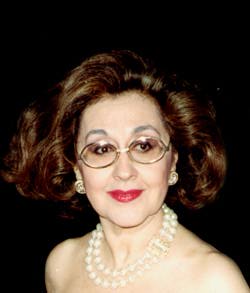
My motto is:
"If I rest, I rust."
For forty-four years, since he was
sixteen years old, he has never stopped working, and the more he studies, travels
and performs, the more fulfilled he feels.
Plcido Domingo was born with anunusually
flexible voice, and he learned
to use it properly. He has been blessed with very good health and stamina, which
has allowed him to be on the go all the time. The greatest pleasure for him has
always been, and still is, to make use of
these gifts and advantages to give
pleasure to others.
By now, Plcido Domingo has sung 118
different roles, more than any other tenor in the annals of music. His repertoire
spans the gamut from Mozart to Verdi, from Berlioz to Puccini, from Wagner to
Ginastera.
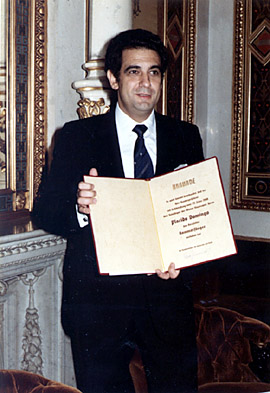
He sings in every important opera
house in the world and has made well
over 100 recordings of which 96 are full-length operas, often recording the
same role more than once, and for which he has earned nine Grammies.
He has made more than 50 videos and 3 theatrically released films which
are Zeffirelliās "La Traviata" and "Otello", and Rosiās "Carmen".
His telecast of "Tosca", from the authentic settings in Rome, was seen
by more than 1 billion people in 117 different countries.
When he opened the 1999-2000 Metropolitan Opera Season with
"Pagliacci", he sang his 18th opening night of a season and, as the New
York Times reported on its front-page, therewith surpassed the old Caruso record of 17 opening nights.
As a conductor, he has led opera performances in all the important theaters, from the Metropolitan to
Royal Opera House, Covent Garden and the Wiener Staatsoper and has conducted purely symphonic concerts
with such renowned orchestras as the Chicago Symphony and the LondonSymphony, in addition to making
recordings as a conductor. As an administrator he was the music director of the Seville Worldās Fair and
in this capacity invited the worldās foremost orchestras and opera companies,
including the Metropolitan Opera, to Seville.
Since the 1996-97 Season, he has
been Artistic Director of the Washington Opera. As of the 2000-2001 Season, he is also the
Artistic Director of the Los Angeles Opera, where he presented his program for the next seasons,
showing a close collaboration with Valery Gergiev and the Kirov Opera and a strong, financial support by
Alberto Vilar.
Born in Madrid,
to parents who were Zarzuela performers, Plcido Domingo moved to Mexico at the age of eight.
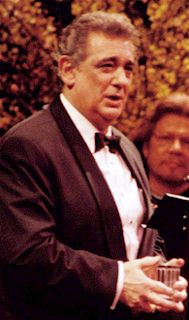
He went to the Mexico City
Conservatory to study piano and conducting, but eventually was sidetracked into vocal training after his
voice was discovered. He made his operatic debut at Monterrey as Alfredo in La Traviata, and then spent two and a
half years with the Israel National Opera, singing 280 performances of 12 different roles.
In 1966, he created the title role in the
United States premiere of Ginasteraās "Don Rodrigo" at the New York City
Opera, while appearing in their standard repertory as well.
His Metropolitan Opera debut came in
1968, as Maurizio in "Adriana Lecouvreur".
He has subsequently appeared there in
more than 600 performances of 41 different roles and is now in his 33rd consecutive season with the company
(2001-2002).
He appears regularly at all major opera
houses including Milanās La Scala, Wiener Staatsoper, Royal Opera House, Covent Garden, Opra National
de Paris, San Fransisco Opera, Lyric Opera of Chicago, Washington Opera, Los Angeles Opera,Liceu in
Barcelona, Teatro Coln in Buenos Aires, Teatro Real in Madrid and at the Bayreuth and
Salzburg Festivals.
Domingoās recordings, whether complete operas, aria or duet
albums or cross-over material, inevitably appear on the best-seller charts and at one time, not long ago,
seven of his CDās appeared simultaneously on Billboard's top selling charts of classical and
cross-over recordings. Eight of his records have gone gold, meaning they have sold well over one million
copies.
His repertoire - 118 different roles, as mentioned earlier - includes almost
all important roles in Italian and French operas. Being constantly challenged by new
roles, his ever expanding foray into the German repertoire consists of Wagnerās
"Parsifal", "Lohengrin" and Siegmund in "Die Walkuere" in
addition to recorded performances of "Die Meistersinger von Nuernberg",
"Tannhaeuser" and "Der fliegende Hollaender", along with
performances of Richard Straussā "Die Frau ohne Schatten", Weberās
"Oberon" and Beethovenās "Fidelio" just recently released. Within the
past two years, he added to his stage performances his first role in
Russian, German in Tchaikovskyās "Pikovaya dama", the Spanish Opera "Margarita la
Tornera" by Ruperto Chapi and Verdiās "La Battaglia di Legnano."
Unlike many of his colleagues, he is also interested in broadening his
repertoire with new compositions, such as Ginasteraās "Don Rodrigo", Menottiās "Goya" and the
world-premiere of Anton Garcia Abrilās "Divinas Palabras", which re-opened the refurbished Teatro
Real in Madrid in October 1997. Also new for him, in his recorded repertoire are two Spanish operas,
Bretonās "La Dolores" and Albenizās "Merlin". For both records he received the Latin Grammy Award in
the category "Best Classical Album".
Highlights of the 2001/2002 Season
include opening the Los Angeles Opera season with "Queen of Spades" (September 4, 7, 10, 13, 16, 2001) and
conducting "La Traviata" (October 19, 23, 27 and November 4, 7, 10, 2001) there;
opening New York's Metropolitan Opera season with a Verdi Gala (September 24,
2001), singing "Idomeneo" (September 29, October 3, 6, 10, 13, 18, 22, 25,
2001 and January 23, 26, 31, 2002) and the company's premiere of Wolf-Ferrari's
"Sly" (April 1, 5, 8, 13, 18, 24, 27, 30, May 4, 2002) and conducting some
"Rigoletto" performances (April 27, May 1, 4, 2002) there; opening Milan's La
Scala season with a new production of "Otello" (December 7, 11, 14, 18, 21,
2001) and later returning there for "Samson et Dalila" (February 17, 20, 23,
26, March 3, 2002) singing "Die Walkre" (October 30, November 3, 2001) and
"Parsifal" (January 13,16, 2002) in Vienna and "Queen of Spades" (June 15,
18, 21, 2002) at London's Covent Garden; singing "Queen of Spades" (May 11, 16,
20, 24, 28, June 2, 5, 8, 2002) and conducting "Ballo in Maschera" (April 2,
14, 20, 2002), "Carmen" (May 18, 21, 29, June 3, 6, 2002) in Washington and then
taking the Washington Opera on a tour of Japan while singing "Otello" (July 7, 10,
14, 17, 2002) after the Japan tour he will perform at the Bayerische Staatsoper
Munich in "Pique Dame" (July 23, 26, 2002) and at the Salzburger Festspiele
(August 13, 2002). In addition he will continue to concertize in solo concerts
and as part of "The 3 Tenors". And he will be again in the recording studio for further
projects, while new releases of just finished projects, will be issued. One of
the most eagerly anticipated of these is his recorded anthology of every aria Verdi
wrote for the tenor voice ("Verdi -
Domingo - The Tenor Arias" DG 471335-2).
Performance Schedule
Domingo's interest in helping young
singers has led to his yearly competition Operalia, which so far has taken place in
Paris, Mexico City, Madrid, Bordeaux,
Tokyo, Hamburg, Puerto Rico, Los Angeles and Washington D.C.. It is the
biggest competition on the international
scene with annual prizes amounting to $200,000, pledged by philanthropist Alberto Vilar. Operalia has launched
many singers to international recognition with its prizes and Domingo's continued
interest in furthering young singers'
careers.
Plcido Domingo has raised millions of
dollars through special benefit concerts in order to help such causes as the
victims of the 1985 Mexican earthquake,
AIDS and the victims of such other disasters as the Armenian earthquake
and the mud-slides of Acapulco.
He is one of the most decorated and
honored artists before the public today and the accolades most often associated
with him is "King of Opera" which was
originally the banner headline on the cover of Newsweek Magazine and "a true
renaissance man in music" which was
first printed in Italyās newspaper "Corriere della Sera".
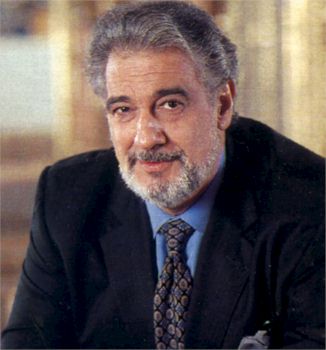
|